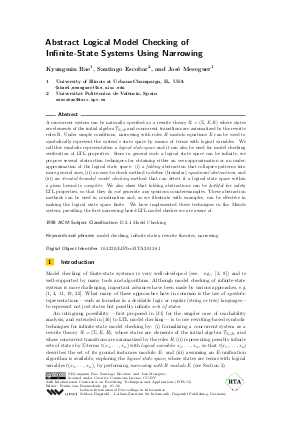Abstract Logical Model Checking of Infinite-State Systems Using Narrowing
Authors Kyungmin Bae, Santiago Escobar, José Meseguer
-
Part of:
Volume:
24th International Conference on Rewriting Techniques and Applications (RTA 2013)
Part of: Series: Leibniz International Proceedings in Informatics (LIPIcs)
Part of: Conference: International Conference on Rewriting Techniques and Applications (RTA) - License:
 Creative Commons Attribution 3.0 Unported license
Creative Commons Attribution 3.0 Unported license
- Publication Date: 2013-06-24
File

PDF
LIPIcs.RTA.2013.81.pdf
- Filesize: 0.67 MB
- 16 pages
Document Identifiers
Subject Classification
Keywords
- model checking
- infinite states
- rewrite theories
- narrowing
Metrics
- Access Statistics
-
Total Accesses (updated on a weekly basis)
0PDF Downloads0Metadata Views
Abstract
A concurrent system can be naturally specified as a rewrite theory R = (Sigma, E, R) where states are elements of the initial algebra of terms modulo E and concurrent transitions are axiomatized by the rewrite rules R. Under simple conditions, narrowing with rules R modulo equations E can be used to symbolically represent the system's state space by means of terms with logical variables. We call this symbolic representation a "logical state space" and it can also be used for model checking verification of LTL properties. Since in general such a logical state space can be infinite, we propose several abstraction techniques for obtaining either an over-approximation or an under-approximation of the logical state space: (i) a folding abstraction that collapses patterns into more general ones, (ii) an easy-to-check method to define (bisimilar) equational abstractions, and (iii) an iterated bounded model checking method that can detect if a logical state space within a given bound is complete. We also show that folding abstractions can be faithful for safety LTL properties, so that they do not generate any spurious counterexamples. These abstraction methods can be used in combination and, as we illustrate with examples, can be effective in making the logical state space finite. We have implemented these techniques in the Maude system, providing the first narrowing-based LTL model checker we are aware of.
Cite As Get BibTex
Kyungmin Bae, Santiago Escobar, and José Meseguer. Abstract Logical Model Checking of Infinite-State Systems Using Narrowing. In 24th International Conference on Rewriting Techniques and Applications (RTA 2013). Leibniz International Proceedings in Informatics (LIPIcs), Volume 21, pp. 81-96, Schloss Dagstuhl – Leibniz-Zentrum für Informatik (2013)
https://doi.org/10.4230/LIPIcs.RTA.2013.81
BibTex
@InProceedings{bae_et_al:LIPIcs.RTA.2013.81,
author = {Bae, Kyungmin and Escobar, Santiago and Meseguer, Jos\'{e}},
title = {{Abstract Logical Model Checking of Infinite-State Systems Using Narrowing}},
booktitle = {24th International Conference on Rewriting Techniques and Applications (RTA 2013)},
pages = {81--96},
series = {Leibniz International Proceedings in Informatics (LIPIcs)},
ISBN = {978-3-939897-53-8},
ISSN = {1868-8969},
year = {2013},
volume = {21},
editor = {van Raamsdonk, Femke},
publisher = {Schloss Dagstuhl -- Leibniz-Zentrum f{\"u}r Informatik},
address = {Dagstuhl, Germany},
URL = {https://drops.dagstuhl.de/entities/document/10.4230/LIPIcs.RTA.2013.81},
URN = {urn:nbn:de:0030-drops-40554},
doi = {10.4230/LIPIcs.RTA.2013.81},
annote = {Keywords: model checking, infinite states, rewrite theories, narrowing}
}
